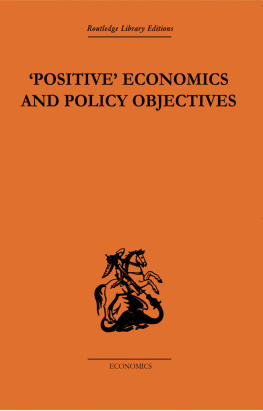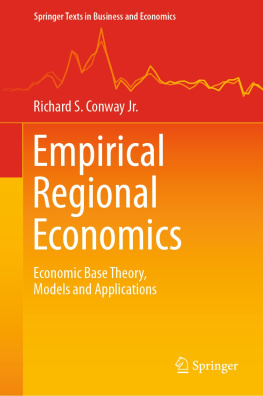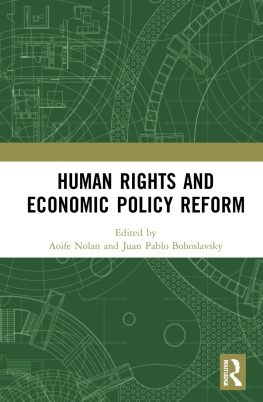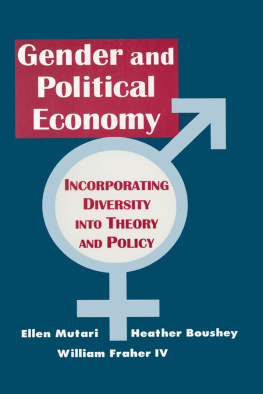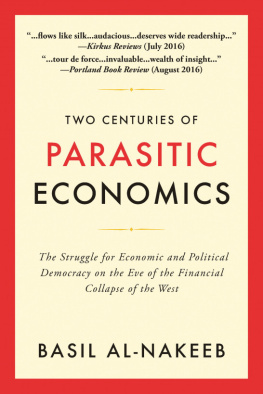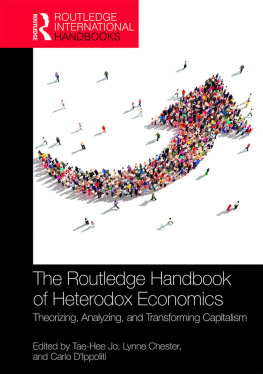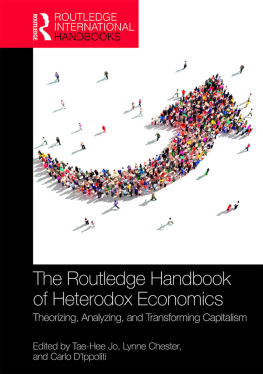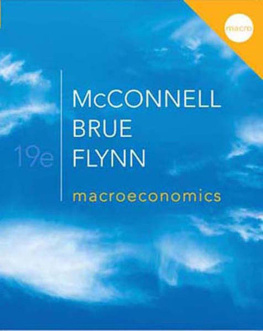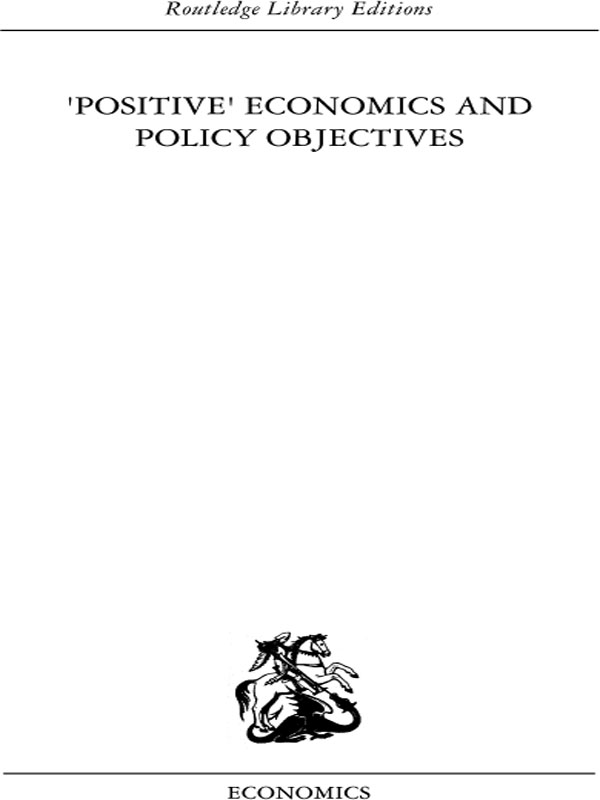METHODOLOGY &
PHILOSOPHY OF ECONOMICS
In 5 Volumes
| I | Economics and Economic Policy in Britain, 1946-1966 |
| Hutchison |
| II | 'Positive' Economics and Policy Objectives | Hutchison |
| III | Economics and Sociology | Lwe |
| IV | Economic Doctrine and Method | Schumpeter |
| V | Lament for Economics | Wootton |
First published in 1964
Reprinted in 2003 by
Routledge
2 Park Square, Milton Park, Abingdon, Oxon 0X14 4RN
or
270 Madison Avenue, New York, NY 10016
First issued in paperback 2010
Routledge is an imprint of the Taylor & Francis Croup
1964 George Allen & Unwin Ltd
All rights reserved. No part of this book may be reprinted or reproduced
or utilized in any form or by any electronic, mechanical,
or other means, now known or hereafter invented, including photocopying
and recording, or in any information storage or retrieval system, without
permission in writing from the publishers.
The publishers have made every effort to contact authors/copyright holders
of the works reprinted in Routledge Library Editions Economics.This has
not been possible in every case, however, and we would welcome
correspondence from those individuals/companies we have been unable to
trace.
These reprints are taken from original copies of each book. In many cases
the condition of these originals is not perfect. The publisher has gone to
great lengths to ensure the quality of these reprints, but wishes to point
out that certain characteristics of the original copies will, of necessity, be
apparent in reprints thereof.
British Library Cataloguing in Publication Data
A CIP catalogue record for this book
is available from the British Library
'Positive' Economics and Policy Objectives
ISBN 978-0-415-31387-2 (hbk)
ISBN 978-0-415-60797-1 (pbk)
ISBN 978-1-136-51932-1 (epub)
Miniset: Methodology & Philosophy of Economics
Series: Routledge Library Editions Economics
To My Wife

This work first began to take on some kind of shape when in the spring of 1960 I delivered four lectures at the Thomas Jefferson Center for Political Economy at the University of Virginia. It was then suggested that these lectures might be written up for publication. I am deeply grateful to the officers of the Center, Professor J. M. Buchanan and Professor Warren Nutter, and to the members of the Economics Department of the University of Virginia, for their valuable criticism and generous hospitality. I am very grateful, also, to Professor Johan kerman for helpful suggestions on the occasion of a most enjoyable visit to his seminar at the University of Lund in September 1960, when I read a paper on some of the questions discussed in this book. My thanks are also due to Professor Giersch and Professor Serf for a very pleasant and profitable stay at the University of Saarbrcken in the spring of 1962, during which I attended a conference of the Vereinfr Sozialpolitik, the forum half-a-century previously of some of Max Webers most challenging pronouncements on Wertfreiheif, and again discussing problems of the application of social and economic knowledge to policy.
I am specially and deeply indebted to Mr Kurt Klappholz of the London School of Economics. He read the typescript with great care and made many penetrating and helpful criticisms. I know I have benefited immensely from discussions with him, and it is entirely my fault if it is not apparent that this book has also benefited. I am also very grateful to Mr I. M. D. Little for constructive comments, especially on Part II, Chapter 2. The research fund of the Faculty of Commerce and Social Science of the University of Birmingham has assisted with typing expenses.
T.W.H.
Paradoxically, the soft sciences that are still akin to an art benefit more from an explicit awareness of the canons of scientific method... than do the hard sciences, where doing what comes naturally will protect even a fool from gross methodological error.
P. A. SAMUELSON
(Problems of the American Economy,
Stamp Memorial Lecture 1961, 1962, p. 21)
More than other scientists, social scientists need to be self-conscious about their methodology.
M. FRIEDMAN
(Essays in Positive Economics,
1953, p. 40)
When the foundations of the theory are discussed in print, one gets the impression that the author is impatientimpatient to get on with the job of reaching ambiguous conclusions. A serious economist hardly likes to be caught at the trivial occupation of discussing foundations.
I. M. D. LITTLE
(A Critique of Welfare Economics,
Second Edition, 1957, p. 4)
The growth of economic knowledge in the last two or three decades has not led to any greater agreement regarding its applications to public policy, or, at any rate, regarding certain crucial questions thereof. The question, or complex of questions, as to how far objective knowledge, free of subjective ethical or political presuppositions, ideological bias, or value-judgments, is possible of the social and economic world, may seem to be one of those perennial philosophical chestnuts which never seem to reach, or likely to reach, anything like a settled or agreed solution. However, even perennial philosophical chestnuts should perhaps be turned over from time to time. And in the last decade, as we shall see, what had developed over about a hundred years into more or less the orthodox, or near-orthodox, view on this question, has been challenged by a wave of sceptical criticism. A distinguished authority has recently stated that the spirited defence of the principle of Wertfreiheit is unfortunately
Possibly, if a thorough elucidation of these statements was carried out, the apparent gulf between them might turn out to be simply a minor difference of assumption or terminology. But it is difficult to tell how far this might be so, because these sweeping categorical pronouncements are usually thrown off as obiter dicta, in a preliminary paragraph or so, with no recognition of any need to argue them out, or that diametrically contradictory views are authoritatively held.
Schumpeter said as regards this subject that the epistemological problem in itself is neither very difficult nor very interesting and can be disposed of in a few words.
Does this matter very much? It certainly does to the methodologist or philosopher interested in light as much as, or more than, fruit. Perhaps it also matters a great deal to those mainly interested in fruit. For although the question of political and ethical value-judgments and biased subjectivity in economics is something of a perennial philosophical conundrum, it is one that bears very closely on the fruit-bearing potential of economics, or on its practical applications to policies. If the applications to public policy of economic theorizing are not to consist to a large extent of arraying rival political points of view in impressively persuasive pseudo-technical jargon, or if the discussion of policies by economists is to amount to something other than a clash of rival brands of political propaganda dressed up in esoteric patter, then an area of consensus, in some sense, or to some extent, objective, must be reached. Surely it is likely to be much more difficult to attain to such a reasonable area or degree of consensus about policies if there is no agreement, or even clarity, not merely as to just what value-premisses and political and ethical presuppositions, if any, are being made, and if so, at just what points, but as to whether or how far they are necessary or in fact being inserted; or as to whether they are being brought in unnecessarily or even illegitimately; or as to how far the economic theories being applied are politically neutral or free of subjective bias.

